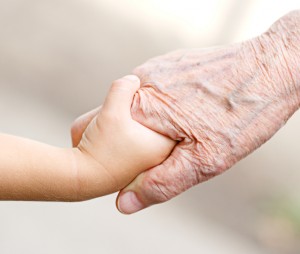It is very common for parents and grandparents to disagree on issues of childrearing, particularly when grandparents are involved in providing some form of childcare. However, the bond between children and grandparents can be mutually nourishing and enriching. Children benefit from having another attachment relationship in which they can feel loved and secure, whereas for grandparents, taking care of their grandchildren may present an opportunity to experience renewed meaning and purpose. Depending on their relative energy level, grandparents can also provide significant concrete support for the family by relieving parents of select chores or tasks such as cooking, grocery shopping, and laundry, which free parents to spend more time with their children .
If you are planning to have grandparents visit for a short time or stay for an extended period to help with childcare, especially following the birth of a child, it is a good idea to plan ahead and consider how to create an environment that is enjoyable and supportive for everyone involved.
Good communication, perspective taking, and knowing when to let go are key for fostering a successful relationship between parents, grandparents, and all children involved.
Many uncomfortable or harmful situations can be avoided through clear communication between parents and grandparents about specific rules or boundaries they would like each other to respect in order to create a consistent environment for the child. For example, parents may request that grandparents adhere to a specific nap and bedtime schedule for the child, but may be more flexible around the types of activities grandparents engage in with the child during the rest of the day. It certainly helps when such boundaries are set ahead of time and expressed openly, but if this is not possible, timely discussion following a scenario when things did not go as expected is the next best approach.
When grandparents are more regularly spending time with grandchildren or may be the source of primary childcare when parents are working, it is also a good idea to set up a way (either through written or verbal communication) for grandparents to keep parents generally informed of the child’s day, any major concerns or problems, as well as new or exciting developments. A shared journal is one way to accomplish this cross-communication and will also result in a memory book that is pleasurable for the child and family members to review for years to come.
Whether grandparents have an occasional hand in caregiving or if they are involved daily may play a role in the degree to which parents communicate their “rules,” desires, and expectations for how grandparents should handle typical caregiving tasks. Perhaps this dialogue will occur every time when grandparents visit their grandchildren, maybe it will be a weekly conversation, or, it might mean a talk that occurs only when there is a specific concern. Regardless of the frequency, highlight the importance of focusing the conversation on the child’s happiness, health and security rather than using the discussion to point fingers at each other. Remember that all caregivers are on the “same team,” and want the best for the child; disagreements usually occur when there are differing ideas of how to get there. Naturally, cultural expectations and generational differences can also create power struggles or challenging conversations between parents and grandparents.
Sometimes some disagreements may not necessarily be worked out. Consider that when there is a history of conflict in the family, disagreements between parents and grandparents may trigger strong negative emotions. These emotions are usually based on past conflicts rather than solely a result of differences in parenting. When negative emotions between caregivers arise, try to slow down behaviors and reactions and when able, examine what the root cause of these strong emotions may be. This process can help in figuring out what issues require confrontation and what can be let go. As children get older and witness their caregivers engaging in successful negotiation and/or coping through letting go and moving on, they too, will become savvier at managing unexpected situations when things do not always go as anticipated.
For additional reading:
Hughes, M.E., Waite, L.J., LaPierre, T.A., & Luo, Y. (2007). All in the family: The impact of caring for grandchildren on grandparent’s health. Journal of Gerontology: Social Sciences, 62(2), 108-119.
Mitchell, W. (2008). The role played by grandparents in family support and learning: considerations for mainstream and special schools. Support for Learning, 23(3), 126-135.
Thomas, J.L. (1990). The grandparent role: A double bind. The International Journal of Aging & Human Development, 31(3), 169-177.
Thomas, J.L., Sperry, L., & Yarbrough, M.S. (2000). Child Psychiatry and Human Development, 31(1), 1-22.
